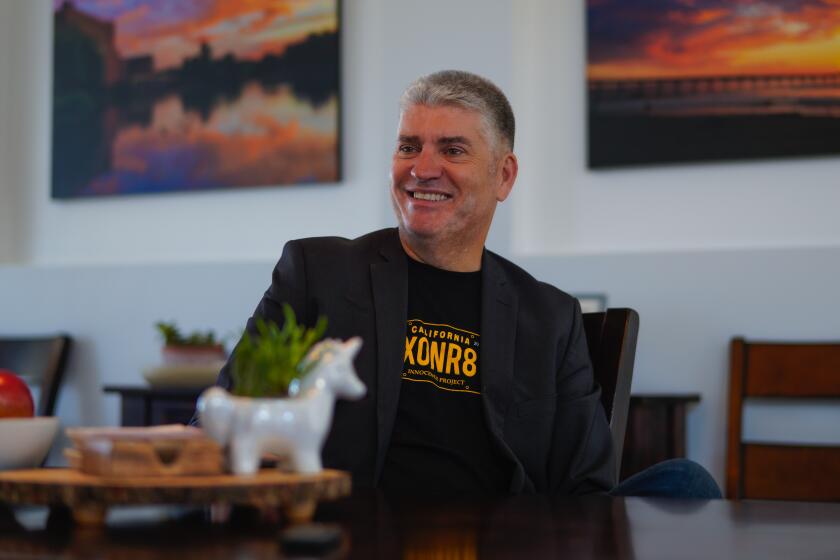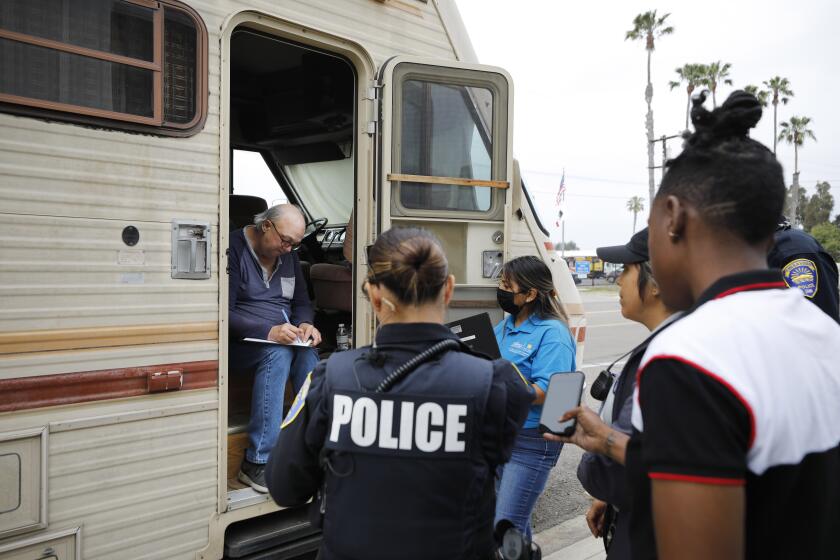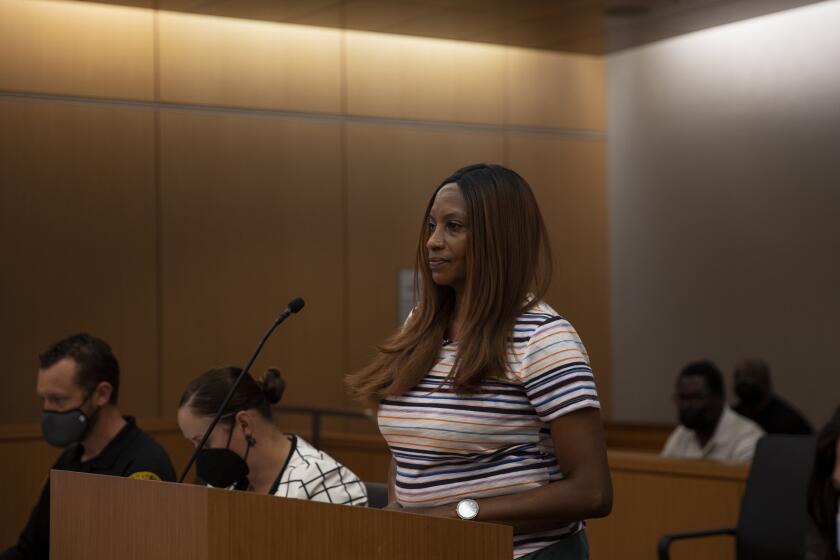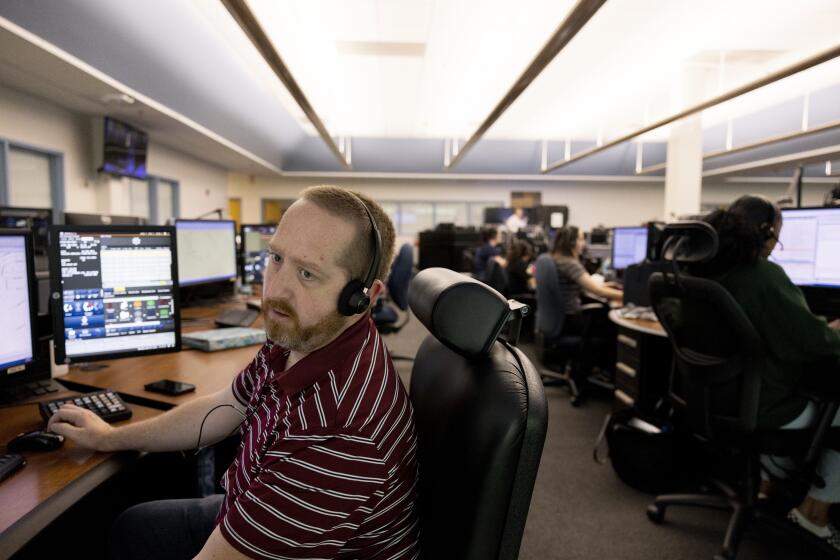Longtime judge, ‘the face of our court,’ retires
Around 10 a.m. Friday, Superior Court Judge David M. Szumowski wrapped up the morning’s cases with minimal fanfare.
The defendant who stood before him was handcuffed and led to the back of the courtroom, past a colorful banner that read, “Happy Retirement.” The few lawyers in the room, many of whom had said their goodbyes to the longtime jurist, gathered up their belongings before heading off.
“That concludes your last calendar, your honor,” said Gloria Barrera, one of the judge’s bailiffs.
And with that, Szumowski rose from his chair, took up the leash of his guide dog, Speedwell, and concluded 18 years on the Superior Court bench. (A more formal send-off for the judge was held later that day.)
“Thank you everybody; it’s been a great ride for me,” he said. “I appreciate all your help and support and concern.”
Szumowski (pronounced shoe-mouse-key) has long been one of the most recognized judges in San Diego County, seen in countless news reports of local cases, high-profile and otherwise. For most of his time as a judge, Szumowski has handled felony arraignments at the downtown courthouse, where defendants are advised of the charges filed against them and enter a plea.
“He was the face of our court for 18 years,” said Assistant Presiding Judge Peter Deddeh.
Known for his sharp sense of humor as much as his fairness, Szumowski, 70, is also notable for having been one of the few blind judges working around the country. Szumowski, an Army veteran, lost his sight when a rocket-propelled grenade hit his tank in Vietnam, sending shrapnel into his eyes more than 45 years ago.
His natural eyes were replaced with prosthetics, the irises a striking shade of pale blue.
“I wore patches and things like that until it dawned on me that (my eyes) weren’t going to get better and they were deteriorating to some extent — not good to look at,” the judge explained in a recent interview. “I thought I wanted to at least have people be able to look at me and not focus on my eyes.
“Everybody focuses on my eyes now and can’t believe they’re not mine,” he quipped.
Szumowski is one of four siblings raised in Gloversville, N.Y., about 50 miles northwest of Albany. The city was named for the hundreds of leather glove factories once located there. His mother, Mary Ann, was a nurse, and his father, Michael, a tank mechanic who served in Gen. George S. Patton’s 3rd Army during World War II.
After high school, Szumowski moved to Virginia to attend the University of Richmond. He joined a fraternity, participated in ROTC and was commissioned into the Army. After he graduated in 1967, he was sent to Vietnam.
He was there about 40 days before he was injured.
“Life took a twist, and I didn’t last very long,” he said. “And after I lost my eyesight they obviously didn’t want me anymore. A lot of that’s changed, though, with medicine and prosthetics going on in the military. A lot of people who are injured are able to stay.”
After the military, Szumowski went to a rehabilitation center for the blind at Edward Hines Jr. VA Hospital in Chicago, where he learned some of the skills needed to navigate life without sight. It was 1969, and he had just turned 24.
There, he learned Braille and how to move around a kitchen without burning himself. And he made things in shop class: leather wallets, a rug he fashioned on a loom, a footstool and two matching lamps crafted with power tools.
“I thought it was all kind of stupid stuff, but I found out it taught me that you could be around dangerous machinery and be safe and also do something constructive,” Szumowski said. “That was kind of a learning curve that I grudgingly acknowledged.”
During the program, Szumowski became adept at walking with a cane, but found the method too slow. So he got his first guide dog, a German shepherd named Jon.
He was the first of six dogs.
Szumowski applied to law school and was accepted to Denver University, in the city where he would meet his future wife, Janice. The couple recently celebrated 31 years of marriage.
He graduated in 1973, but struggled to find work in Colorado. He spent three years “wallowing in self-pity,” Szumowski said, then decided to move to San Diego. Here, he spent several years working as a counselor for the Veterans Administration and later executive director for Vietnam Veterans Leadership.
He passed the California bar exam, got a small business loan and opened an office in private practice.
“I didn’t attract a lot of clients, but I had really nice furniture,” he said. “I sold that off cheap when I went broke about a year later.”
At his wife’s encouragement, Szumowski applied for a job in the District Attorney’s Office, where he spent the next 12 years working as a prosecutor. In March 1998, he was appointed to the Municipal Court by Gov. Pete Wilson, and became a Superior Court judge later that year when the courts were consolidated.
Szumowski said the District Attorney’s Office and the courts provided whatever equipment or staff he needed to assist him in doing his job. In court, clerks helped him read files in the mornings before he presided over probation revocation cases. In the afternoons, a court staffer would sit next to him in the courtroom and whisper pertinent information in his ear as he handled arraignments.
“It’s busy, and I like to be busy,” Szumowski said of his longtime assignment in Department 12.
Among the dozens of people who attended Szumowski’s retirement party in the jury lounge Friday afternoon were fellow judges, prosecutors, public and private defense lawyers and members of the court staff.
“He’s a great judge,” said Kevin Milmoe, a defense attorney who has appeared with clients in Szumowski’s courtroom nearly every day for nine years. “He has empathy and compassion for the defendants, and he does the right thing all the time. It’s uncanny.”
Barrera, the bailiff, commended Szumowski for his bravery in life and work. She said it was a unique experience working in his courtroom for nearly four years. “He’s not like any other judge,” she said.
Szumowski said he’ll miss the people he’s worked with over the years, but he won’t miss the work.
“I’ve been very fortunate to be given opportunities, and I guess I have taken advantage of the chances given to me,” he said. “I’ve enjoyed it, and I’m proud to have served San Diego County for 30 years now. And I’m looking forward to the next adventures in my life.”
As for what’s next, he said he plans to keep working out, become fluent in Spanish, write his autobiography and travel with his wife. The couple has no children. And he’ll spend more time on the golf course, improving his game.
George Beall, a retired deputy district attorney, plays regularly with Szumowski. When it’s the judge’s turn to putt, Beall lets him know the distance to the hole, adjusting for the slope of the green. Occasionally, they bet on the games and Szumowski often wins.
“It’s truly amazing, it really is,” said Beall, also a Vietnam vet. “He has the patience of Job.
“It’s a moral conundrum,” he joked. “Do I line him up right or do I win the bet?”
dana.littlefield@sduniontribune.com





